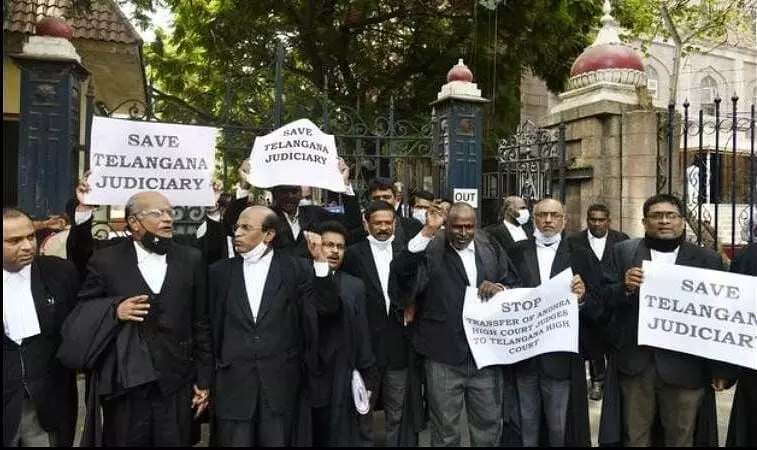Explained: Why are Telangana High Court advocates protesting?
By Nimisha S Pradeep
Hyderabad: On 13 April, the advocates of the Telangana High Court staged a protest against the appointment of judges from Andhra Pradesh in Telangana HC. Approximately 50-60 advocates joined the protest.
What led to such a demonstration?
The advocates of Telangana HC were protesting against the appointment of judges from AP in Telangana. They also raised concerns regarding the transfer of judges from Telangana to other states. They fear this would give even more space to accommodate judges from AP. One of the key demands made during the protest was not to bring judges from other states to Telangana.
"Lately, in the last two-three years, this trend is increasing," said senior counsel Satyam Reddy who led Wednesday's protest. He said this was harmful to the interest of Telangana. "In this whole process of transfers, our people are being denied opportunities," he added.
Further, he pointed out how the partition of Andhra Pradesh in 2014 itself posed and continues to pose a threat to the judges from Telangana. "During the partition, some judges from AP opted to be appointed in Telangana HC. As a result, these judges are now taking up higher positions in TS HC," he said.
A senior counsel of Telangana HC, L.N Ravichander, emphasised the need to look at the issue from a historical perspective.
Absolute lack of transparency in transfers
In the backdrop of the protest, senior counsel L.N Ravichander raised another concern regarding the complete lack of transparency in the transfer process. He said these transfers are arbitrary. "How are these choices of judges made? How do they decide whom to transfer, whom to retain?" he asked.
He also pointed out how some judges are being transferred just a year or two before their retirement. Mr. Ravichander said this is a very dangerous situation and is a threat to the independence of the judiciary itself. "What if tomorrow the executive also has similar arbitrary powers to appoint/transfer judges?" he asked.
The advocate also explained how such ambiguous transfers result in various rumours inside courtrooms and will eventually affect the confidence of judges. "Whenever a judge is transferred, a lot of rumours spread about them. It is believed that the bad ones are always transferred. This leads to somebody being tarnished as a bad judge," he said.
M. Sridhar Acharyulu, the ex-information commissioner- GOI, explained how the judiciary was divided at the time of partition. "During partition, there were not enough judges from Telangana to work in the Telangana High Court. So, it was opened up for judges from AP as well and some of them opted to work here. Some were forced to work here as well. There was no problem at all for some years," said Mr. Sridhar.
According to him, the problem started when judges from Telangana were being transferred to other states. While he supports the idea that a judge of Telangana origin should be able to work in Telangana, he said that the state is unable to do so. There has been a substantial increase in appointing judges from Telangana in the TS HC but it will take some time to fully have state-origin judges, he said.
However, Mr. Sridhar urged the appointing authorities to increase the appointment of judges from Telangana and gradually bring a balance. Moreover, he also emphasised the need for transparency in such appointments. "In the USA, after a wide range of discussions, the first black judge was appointed to the apex court. Such discussions in appointments should take place here as well," he added.
Legality of transfers
India follows the Collegium System of appointment and transfer of judges – a system that evolved through various judgments of the Supreme Court and not by any law or the Constitution.
Advocate and legal correspondent Umesh Chandra expressed a neutral stand on the issue and said that he neither supports nor is against the protesting advocates. Speaking from the legal framework, he said, "The collegium has the exclusive authority when it comes to transfer and appointment of judges in any High Court and this authority is non-disputable." He added that if there are any grievances, the same can be conveyed with the help of proper platforms.